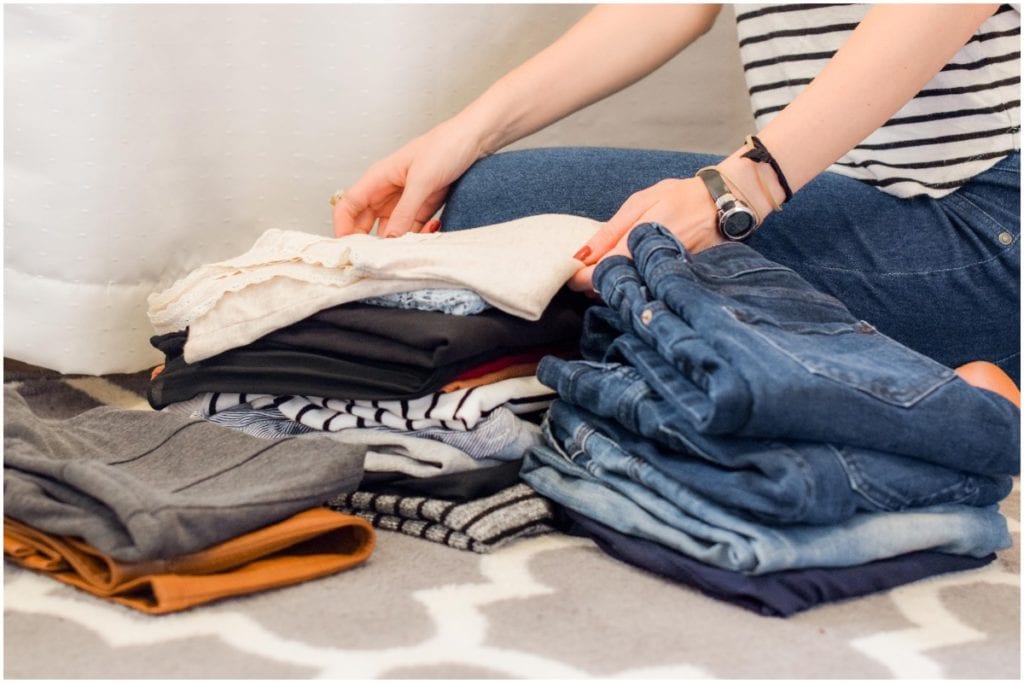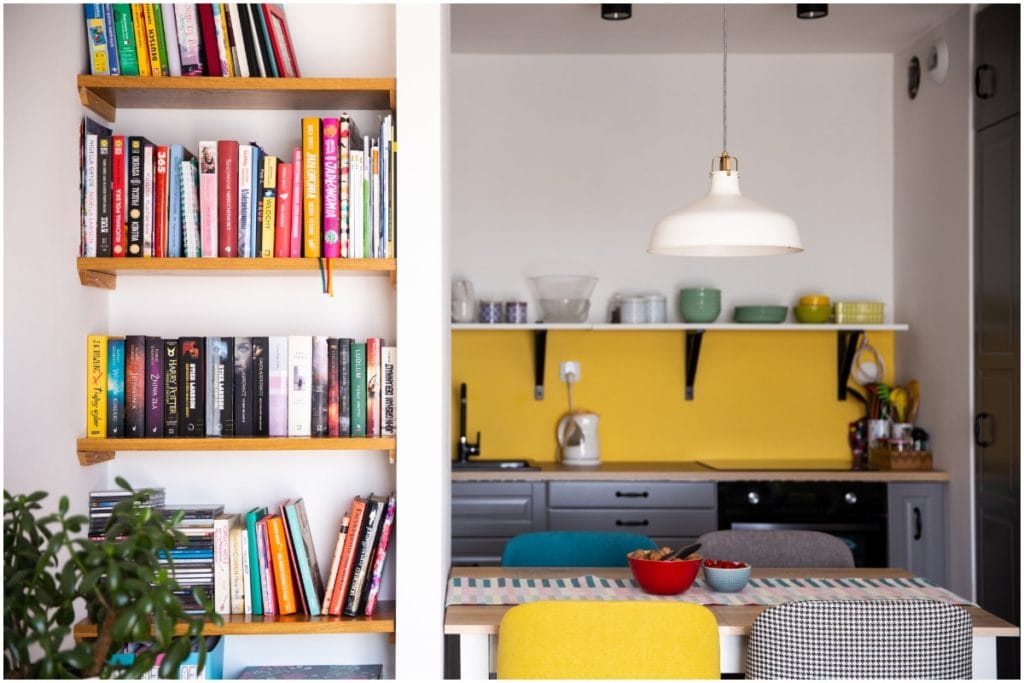Whether you’re used to living in a small space somewhere like New York, or you just recently downsized, you’ve probably quickly learned how crammed it can feel if you aren’t carefully utilizing every inch of space. But with a little purging and reorganizing, it’s easy to make your home look and feel more spacious. To help, we talked with organizing professionals to find out their best space-saving solutions.

1. Empty out everything first. It’s tempting to start organizing with everything still in its place, but there are always advantages to organizing by clearing the space first. You will find some things that were hidden and will be able to make better decisions about what to keep or donate. Plus, while everything’s out, it’s a great time to dust off shelves or vacuum out the closet. – Bring Peace Home, Stefanie Wyres
2. Less is so much more, especially when it comes to the clothing inside your closet. For my Denver clients who live in smaller homes with smaller closets, a closet edit is the very first step we take! Chances are, you only like and wear about 20% of your wardrobe. After that, I highly recommend thin velvet hangers to save space inside your closet. – The Style Shop, Sandi Mele
3. Create zones in a larger space, like a studio apartment, so it feels like each area has its own function. Zones can be separated by a screen or curtain or by arranging furniture in groupings that section of the space. Free-standing room screens start at about $40; a curtain, rod, and hooks can start at about $50. – Let’s Get Organized, Gayle M. Gruenberg
4. Store your placemats and clean napkins UNDER your sofa cushions. It keeps them nice and flat and is perfect for meals on your coffee table as well. – Simplify You, C.Lee Cawley
5. Use dual-purpose furniture. Multipurpose is the name of the game for tiny living, including furniture. Avoid large, bulky items, and instead aim for flexible, movable options, such as ottomans with storage that can be used for seating, a coffee table, or footrest. Or a folding table with wheels that can serve as a desk, dining table, or craft area. Do a search on Amazon for “folding table with wheels,” and you can see all the fun possibilities! – Priority Focused Organizing, Diane Greenhalgh
6. Store off-season clothing in a clear container at the top of your closet or use a flat container on wheels that will fit under a bed. – Simple Solution Organizing, Adele Tusson-Gross
7. Organize your things in a way that supports your habits. Know your routines and how you function then use that knowledge to decide which very specific things you need and where those things will live. To maximize efficiency in a tiny space, only keep exactly the things that you use in your daily life and always keep those things in the space where you use them. – Create Infinite Space, Jessica Borelli
8. Think vertical. Go to the ceiling with storage and function. Add a wall-mounted desk with mounted shelving above. Maximize the vertical space with four or five narrow bookcases that hold labeled bins and baskets, books and notebooks, and framed photos and keepsakes at the top. – Professional-Organizer.com, Ellen Delap

9. If you have a small kitchen, buy multi-purpose appliances. Get a blender that can also work as a food processor. If you have a steamer that you can cook rice in, there is no need to have a rice cooker as well. This way you cut down on your inventory and double your space. – Mission 2 Organize
10. Think outside the box. When it comes to small kitchens, think “outside the box” (or kitchen). Store less-used items in a basement, garage, or even a guest room closet. – Call 2 Sisters
11. Invest in a good looking step ladder. This way you can make the most of all your vertical space and access it easily. Most step ladders are a bit utilitarian looking so take the time and find one that fits with your design vibe. – Merchandised Maison, Shelley Malik
12. Organize hallway closets. Hallways are the first place in people’s homes to make an impact so this is one area that you need to maximize the usage of available space by ensuring you only keep what’s needed there. As a KonMari Consultant, I like to organize by category – if you look at what’s in your hall it’s mainly coats, shoes, and bags. However, if you just tidy the items in the hall you’ll find that similar items from around the rest of your home migrate back within a couple of days. To prevent this you need to store just the items that are used every day in the hall and find a home for the remaining items elsewhere in the house. – A Life More Organised, Sue Spencer
13. Don’t let your interests turn into your clutter. Like to read? Keep only the current book on your nightstand and invest in a small bookcase for the collection. For hobbies that have parts (think quilting, Leggos or photos) purchase multiple-use containers. They will serve you in many ways when you interested in the current project wanes. – The Zen Organizer, Regina Leeds
14. Maximize space in a closet, cabinet, or drawer. This can have a major impact in a small house. By getting rid of stashed-away items you no longer need or want, you create space and a potential new “home” for things you treasure.- Light House Organizer, Suzanne Lindsey
15. Reduce Paper Clutter. Think twice before printing information from the internet or from your computer. Develop effective systems for filing on the computer and have backup systems to ensure that your files are safe. – Amazing Spaces, Renée Ory
16. Remove packaging from pantry items. Living in a small home means creating meals in a small kitchen, often with little pantry storage. To maximize space, remove as much packaging as possible from pantry items, like snacks and bars, and put them into a simple basket or container. This low-cost tip alleviates the potential for partially empty boxes taking up valuable space as food items are used up, makes it easy to see what you have on hand and not buy duplicates, and maximizes available space. – Simplify Studio, Lisa Smith

17. Purge clothing from your closets. Every time you wear something, turn the hanger around. If by the end of the season there are hangers left without having been turned, you’ll know you haven’t worn that piece the whole season. It’ll help you weed out clothes you may not even realize you haven’t worn! – Sage Organization & Design, Jolin Polasek
18. Use benches rather than chairs in your kitchen area. This can save a lot of space and the dining table can be used as an additional kitchen counter space. – Find Serenity Space, Jane Rice
19. Think outside the box for your pantry. In small kitchens, pantry space for dry and canned goods may be limited but there’s no law that pantry items have to live in the kitchen. My small kitchen forced me to think outside of the box so I have created a pantry in the closet of my home office by using a free-standing wire shelf rack. I’ve seen and have helped clients use basements, garages, hall or guest room closets, china hutches, and armories as a pantry! – Minding Your Manor, Julie Ulmer
20. Understand our personal approach to clutter. When decluttering a small space it’s important we look at the practical aspects of the process. However, we first need to take the time to understand and overcome the thoughts, beliefs, and emotions that are behind our gathering of clutter and our inability to declutter. True freedom and peace of mind come from learning to let go of what’s weighing us down on all levels. This inevitably brings unexpected, exciting transformation to all areas of our lives as well as our wardrobes, homes, and workspaces. – Declutter Therapy, Breda Stack, Declutter Therapy Programmes and Professional Certifications
21. Follow the 3P’s. When organizing anything, use the 3P’s of organizing: Pair like items together; Purge what you no longer love or use, and Place the items in the best storage based on the frequency of use. – Enuff With The Stuff, Maria White
22. Over-the-door storage. My favorite tip is using a Container Store Elfa door rack on the inside of closet doors. They work great inside a linen closet door and are the perfect place for a hairdryer and all sorts of toiletries. Plus, it’s not permanently attached to the door so you can take it with you when you move. – Balanced Spaces, Susan Kousek
Over-the-door storage can also hold purses, shoes, socks, or even a hamper. Here are some products that I have strategized for various clients:
- Umbra shelves and hamper
- Meant for shoes but also good for socks & underwear
- Another shoe organizer but with vertical pockets
- Umbra towel rack (great for airing out clothes) – One to Zen Organizing, Jill Katz

 United States
United States Canada
Canada